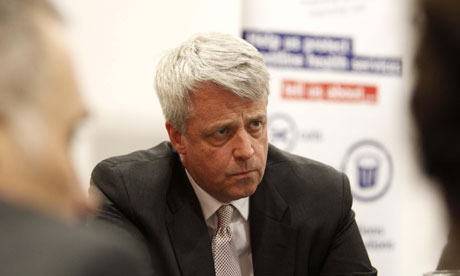Lansley apologises for failing to explain NHS plans
Health secretary says sorry to nurses, and expresses his commitment to maintaining a healthy NHS

Health secretary Andrew Lansley talks to a small group at the Royal College of Nursing Congress. Photograph: Peter Byrne/PA
Andrew Lansley coupled an apology to Britain's nurses for failing to explain his health reforms with an impassioned statement of his commitment to the NHS.
Hours after the Royal College of Nursing voted 99% in favour of a motion of no confidence in him at the RCN congress in Liverpool, the health secretary told nurses that he would have voted with them if he thought his plans would undermine the health service.
"I did read what was said this morning and the result," Lansley said shortly before holding a seminar with 60 nurses as part of the government's "listening exercise" on the health and social care bill. "I'm sorry if what I'm setting out to do hasn't communicated itself...Listening to the vote this morning, if I've not got that message across then I apologise."
The health secretary sought to underline his commitment by making clear that his only ambition in politics is to serve as health secretary. He said he had told the prime minister of this "publicly and privately".
Lansley's appearance in Liverpool was the most high-profile event since David Cameron joined forces last week with Lansley and Nick Clegg to announce that the health and social care bill is to be put on hold for two months to allow for the listening exercise.
Downing Street fears that Lansley's failure to sell the reforms, which are designed to transfer commissioning powers from Primary Care Trusts to new GP-led consortiums by 2013, is jeopardising years of work in neutralising the NHS as an issue. Clegg must secure major changes to the bill to win over his party, which voted against the reforms at its spring conference last week.
Lansley echoed the deputy prime minister's call for substantive changes after addressing a meeting of charity health workers at Downing Street, hosted by the prime minister, before he travelled to Liverpool. He said: "Of course they're substantive changes, because otherwise it would be trivial. We're not here to do a trivial thing, we're here to get it right." It is understood that one of the "substantive changes" would be to give nurses places on the new GP-led consortiums. That has been a key demand of the RCN which represents nurses across Britain although the Lansley reforms only apply in England.
But there are signs of tensions within the coalition. Clegg believes "substantive" changes means that the government should consider going beyond the framework outlined by Lansley. He said ministers would look to improve the transparency and accountability of the consortiums and would offer assurances that the government is not handing an unfair advantage to private companies bidding for NHS contracts.
The deputy prime minister is under pressure from within his party to go much further. Norman Lamb, his senior parliamentary adviser, has threatened to resign unless "clusters" of Primary Care Trusts are maintained and GPs are given the right to opt in to the reforms. Lamb also called for the 2013 deadline to be abandoned.
Clegg does not go along with all his demands. But he agrees that greater flexibility should be shown round the deadline. Lansley has not yet agreed to any relaxation in the deadline. He also agrees with Lamb's call for an "opt-in" approach on the grounds that this would create a two-tier NHS.
Ed Miliband, the Labour leader, called for the bill to be abandoned as he warned that it would make the NHS subject to EU competition law, possibly leaving hospitals open to "huge fines" of up to 10% of their income. "This is a bill that starts with a wrong-headed ideology and has a whole series of proposals which haven't been thought through," he said.
The row came as the King's Fund published a report on patients' chances of undergoing surgery for common medical conditions in England. It found last year rates of patient admission for routine operations, such as hip and knee replacements, varied wildly between England's highest and lowest ranked trusts.
John Appleby, chief economist at the King's Fund, said: "This report confirms research over decades, both in the UK and internationally, which has shown persistent and unwarranted variations in use of and access to even the most common surgical procedures. This is unfair to patients and inefficient for the NHS. Remedying this is urgent given the need to improve quality of care while the NHS grapples with the biggest financial challenge in its history."
No comments:
Post a Comment